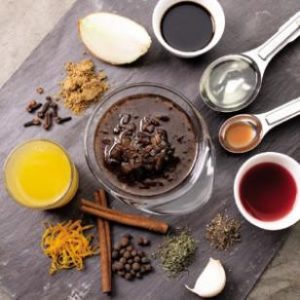
by: Michael Sheridan
It’s a sad fact that these days it has become almost essential to marinade most cuts of meat, unless you intend to casserole them.
I’ll go into why that is the case a bit later on, but for the time being let’s just examine why we use marinades at all.
Principally there are two reasons. One is to add flavor, and the other is to tenderize. Usually, we are trying to do both.
It’s worth bearing in mind that marinating is a cooking process, even though heat is rarely applied. The importance of recognizing this is that, like any other cooking process, you can overdo it.
It’s not just a case of putting the meat or fish in a sauce and leaving it there until you are ready to use it. Many of the fruit juices we use in marinades, such as lemon and pineapple, contain enzymes that break down proteins. In essence, what they do is digest them.
Leaving meat in them for too long would result in an unpalatable mush. If you want to try this for yourself, leave a piece of pork in fresh pineapple juice overnight and then see what happens when you cook it.
You probably won’t like the result.
Why is meat tough?
It’s a tragedy that although we are killing our animals at an earlier age in order to satisfy the demand for fresh meat, the end product still tends to be tough.
There are good reasons for this and it is useful to have a working knowledge of them if only to avoid potential disasters.
It is not, as some cooks would have you believe, simply a matter of finding a butcher who will take the trouble to discuss your needs with you, if indeed such a person still exists outside of the more fanciful cookbooks.
Our meat is tough because it started out that way. And here’s why (if you are squeamish, skip this section):
When an animal is killed its muscles (protein) go into spasm caused by the injection of the well-known fight or flight chemicals released by the brain.
Under normal conditions, that is to say in the natural world, this would be followed by rigor mortis setting in, followed by a gradual relaxing of the proteins back to their normal state.
However because of the speed at which the slaughter and preparation of carcasses is carried out, this vital, natural step is rarely if ever completed. The animal is killed, cooled and frozen in one continuous process.
The result is toughened proteins.
A butcher who hangs his meat can, to some extent, reverse this effect. If you ever find one, hang on to him for dear life. You have found a rapidly disappearing treasure.
The alternative is to use marinades.

Basic principles
Marinades can be wet or dry and you can add just about any flavor you desire to them.
When a marinade is liquid, the base is usually acidic. As I said earlier, this may be fruit juice, but wine, vinegar or even beer may also be used. As a matter of fact I know of one cook who uses Coca-Cola.
If it marinades meat, just think what it’s doing to your insides.
Steeping in the marinade may take anything from a few minutes to several hours, and even overnight in the refrigerator.
The more delicate the proteins, though, the more chance there is of overdoing things. Fish, for example, should rarely be in a marinade for more than 30 minutes, particularly if lemon juice is involved (which it usually is).
Red meat, on the other hand, can sit in the refrigerator all night without coming to any harm. So can pork and chicken, providing there are no enzymes present of the type described above.
In other words, if you are using fresh fruit juice, keep the marinating time to a minimum. That is to say, no more than an hour at the outside.
Come to think of it, if either of those meats needs longer than that to tenderize it, it’s definitely time to change your supplier.
Caution
Whatever marinade you use, throw away any uncooked portion once you have finished with it. Do not taste it after the meat has been put in it, and do not use it for anything else.
If you want to heat it through to use it as an accompanying sauce, by all means do so, but ensure that it comes to the boil and that it cooks for at least 10 minutes.
Alternatively, heat it in the microwave, which will achieve the same thing in a shorter space of time.
Marinades are the perfect medium for food poisoning bugs to take their vacations in, and when bugs are on holiday they are happy. And when they are happy, they multiply. A bit like us, really.
If in doubt, throw it away.
Copyright © Tingira Publishing 2004 All Rights Reserved
| About The Author
Michael Sheridan was formerly head chef of the Pierre Victoire restaurant in London’s West End, specializing in French cuisine. |



































